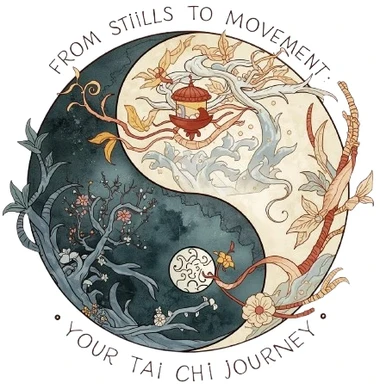What is Qigong? If you've ever wondered how to find calm in a busy world, you're not alone. Honestly, here's the deal: Qigong (pronounced "chee-gong") is an ancient Chinese practice of cultivating your body's vital energy, or "Qi." It's like gentle exercise for your inner battery.
And what are the 6 Healing Sounds of Qigong? They are a secret weapon within Qigong called Liù Zì Jué (Six Healing Sounds). This is a powerful yet simple practice where you use six specific sounds, movements, and breathing to cleanse and strengthen your major organs.
A quick note: a lot of people ask, "Are Qigong and Tai Chi the same?" Not quite! Tai Chi is a martial art that flows like a slow dance.
Liù Zì Jué is a purer form of medical Qigong. It’s more focused on your health from the inside out.
At its heart, Qigong is good for you because it helps your body's natural energy flow smoothly, and that’s what we’ll explore together.
Your Cheat Sheet to the 6 Healing Sounds
Let's break it down. Here is a simple table to give you the big picture of the Six Healing Sounds.
Keep this handy as you read!
| Sound | Chinese Character | Organ It Helps | The 5 Elements | Key Benefit (The Short Version) |
|---|---|---|---|---|
| Xū (Shhh-ee) | 嘘 | Liver | Wood | Releases anger & stress. Feels like a sigh of relief. |
| Hē (Huh) | 呵 | Heart | Fire | Calms the mind & improves circulation. It's like a warm hug for your heart. |
| Hū (Who) | 呼 | Spleen | Earth | Aids digestion & boosts energy. Think of it as internal housekeeping. |
| Sī (Sss) | 呬 | Lungs | Metal | Clears grief & strengthens immunity. A breath of fresh air for your whole system. |
| Chuī (Ch-way) | 吹 | Kidneys | Water | Reduces fear & boosts willpower. It's like charging your body's core battery. |
| Xī (Shee) | 嘻 | San Jiao (Triple Warmer) | N/A | Balances all your energy & relieves tension. The ultimate "reset" button. |
Why This Practice is a Game-Changer
So, what are the benefits of Qigong like this? Honestly, the list is long. This isn't just stretching; it's a tune-up for your internal systems.
The health benefits of Qigong through the Six Sounds can include:
- Stress Meltdown: The focused breathing tells your nervous system to relax. Does Qigong help with anxiety? In my experience, yes, almost instantly.
- Organ Detox: Each sound creates a vibration that massages and cleanses its corresponding organ.
- Better Sleep & More Energy: By balancing your Qi, you calm down to sleep better and wake up more refreshed.
Many students ask me, "Can Qigong lower blood pressure?" or "Can Qigong help arthritis?" While you should always talk to your doctor, the gentle movements and stress-reducing effects are fantastic for supporting overall wellness.
It’s about giving your body the best possible environment to heal itself.
How to Get Started with Six Healing Sounds
The best part? You can start right now. You don't need any special equipment. Here’s a simple way to think about your first practice.
First, Get Comfortable.
Find a quiet spot. Stand with your feet shoulder-width apart, knees slightly bent. Imagine a string pulling the top of your head gently towards the sky. Just relax and take a few natural breaths.
The Magic is in the Breath.
All Qigong exercises in this series use a special breath:
- Breathe IN gently through your nose.
- Breathe OUT slowly through your mouth, making one of the six sounds. This is the core of the Qigong healing process.
A Tip from Tai Chi Wuji: When you start, don't worry about being perfect. The goal is to connect the sound, the breath, and a gentle movement. Even doing one sound for a few minutes can make a difference. How often should you practice Qigong? I tell beginners, "Just 10 minutes a day is better than one hour once a week."
Let's Master the First Two Healing Sounds
Ready to get started? Honestly, learning how to do Qigong is like learning a new language for your body. It’s simple, but it takes a little practice. Let's break down the first two sounds.
A Quick Tip Before We Begin:
Remember the table from the first part? Keep it in mind! It’s your roadmap. The goal is to connect the sound, a specific mouth shape, a simple movement, and your intention. Don't force your breath.
Let it flow.
Sound #1: Xū (Shhh-ee) – For Your Liver & Letting Go
What it does: The Xū sound is your go-to for frustration. Stressed after a long meeting? Feeling irritable? This is like a pressure valve for your entire system. It targets the Liver in Traditional Chinese Medicine, which is all about smooth flow.
How to practice the Xū sound:
- The Mouth Shape: Part your lips slightly. Pull your corners back, like you’re about to whisper a long "Shhhh" to someone. Your teeth should be parallel with a small gap, and your tongue resting flat.
- The Movement: Inhale gently through your nose. As you exhale and make the "Xū" sound, slowly turn your upper body to the left. At the same time, sweep your right arm up and out, as if gently pushing stress away. Your palm should face out. Let your eyes gently follow your moving hand. This connects the sound to the liver meridian, which is linked to the eyes.
- The Feeling: Imagine you’re exhaling all your pent-up stress and annoyance with that long, sighing sound. Feel a sense of release.
A Tip from Tai Chi Wuji: You might feel a little silly at first. That’s okay! The vibration of the sound is what matters most. How to practice Qigong successfully is to focus on the feeling, not just perfection.
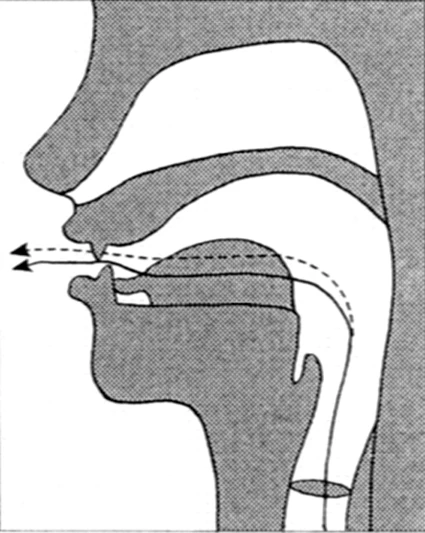
Sound #2: Hē (Huh) – For Your Heart & Happiness
What it does: The Hē sound is like a warm, comforting blanket for your heart. Can Qigong heal emotional wounds? While it's not a magic cure, this sound is designed to calm your mind, ease anxiety, and bring a sense of joy. It corresponds to the Heart and the Fire element.
How to practice the Hē sound:
- The Mouth Shape: Open your mouth moderately wide. Your tongue should gently rest against your lower teeth. It’s the mouth shape you make when you see something adorable and let out a relaxed, "Awwww."
- The Movement: Inhale as you bring both hands up, palms facing the sky, until they are at the level of your heart. As you exhale with the "Hē" sound, flip your palms to face outward and slowly push them forward and apart, as if you’re opening heavy curtains to a beautiful view. Simultaneously, sink your weight down slightly into your knees.
- The Feeling: Visualize warmth and radiant light spreading from your heart center out through your arms and hands. You are exhaling worry and inhaling calm.
This is a powerful one. Does Qigong help with anxiety? The Hē sound is a perfect example of how it can. It forces you into a slow, controlled exhale, which directly tells your nervous system to calm down.
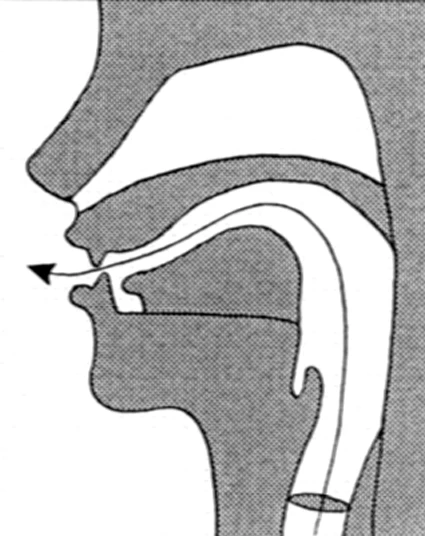
But Wait... Is This Practice Safe For Everyone?
This is a really important question. Is Qigong safe? For the vast majority of people, absolutely. It’s one of the gentlest Qigong exercises you can do.
However, let's talk about who should not do Qigong or should be careful.
- If you are pregnant, some movements and intense breathing may need to be modified. Always check with your doctor.
- If you have a serious health condition, like severe osteoporosis or recent surgery, avoid any strenuous stretching.
- Listen to your body! If you feel dizzy, stop and rest. The breathing is powerful.
Can Qigong be harmful? Only if you push through pain or ignore your body’s signals. The beauty of Liù Zì Jué is its gentleness. You should finish a session feeling refreshed, not exhausted.
Your First Simple Routine
You don't need to learn all six sounds at once. Here’s how to start today:
- Find Your Space: Stand in a quiet spot for 5 minutes.
- Warm-Up: Do 3-4 gentle cycles of the Xū sound on each side.
- Follow with Calm: Do 3-4 cycles of the Hē sound.
- Notice How You Feel: Do you feel a little lighter? More centered? That’s your Qi already starting to balance.
How often should you practice Qigong? I always say, consistency beats duration. Five minutes every day is far more powerful than an hour once a month.
Unlock Your Body's Natural Vitality with Three More Sounds
Alright, let’s keep this momentum going! Maybe you’ve tried the Xū and Hē sounds and felt that subtle shift. That’s your body saying "thank you." Now, we’re going to explore three more sounds that are absolute powerhouses for your daily well-being.
Here’s a fun question I get all the time: "Does Qigong build muscle?" Honestly, not in the same way weightlifting does. But think of it this way: you’re not building biceps; you’re building your internal strength—your energy, your resilience, your core vitality. And that’s a different kind of powerful.
Sound #3: Hū (Who) – For Your Digestion & Stability
What it does: The Hū sound is your best friend after a meal. It targets the Spleen and Stomach, the central engines of your digestive system in TCM. If you ever feel bloated, sluggish, or weighed down by worry, this sound acts like internal housekeeping.
How to practice the Hū sound:
- The Mouth Shape: Make a perfect "O" with your mouth, like you’re about to blow out a candle softly. Your tongue should be slightly retracted. It’s a deep, hollow, throaty sound.
- The Movement: Inhale as you bring your hands in front of your stomach, palms facing up. As you exhale with the "Hū" sound, rotate one palm to face outward and rise up near your head, while the other palm faces down and presses gently toward the ground. Your body gets a lovely, gentle stretch. Alternate sides with each repetition.
- The Feeling: Visualize your digestive fire being stoked and balanced. You are exhaling dampness and heaviness, making space for clean, steady energy.
Can Qigong help you lose weight? While it's not a cardio workout, practices like the Hū sound support healthy digestion and metabolism, which are crucial for maintaining a balanced weight. It’s about helping your body function at its best.
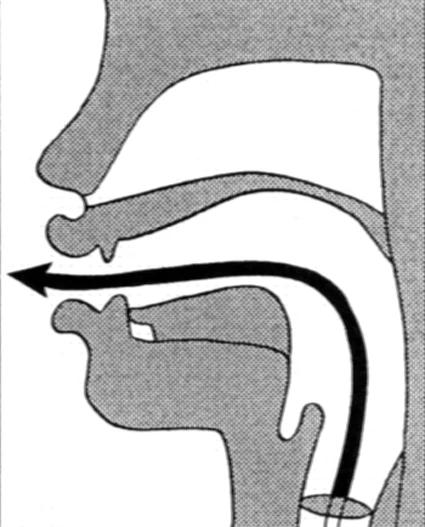
Sound #4: Sī (Sss) – For Your Lungs & Immunity
What it does: The Sī sound is like a breath of fresh, clean air for your entire system. It corresponds to the Lungs and the Metal element, which is all about letting go of what no longer serves you—be it physical toxins or the grief and sadness we sometimes hold.
Does Qigong healing really work for this? This sound is a perfect example of its cleansing power.
How to practice the Sī sound:
- The Mouth Shape: Part your lips just a little. Your teeth should be gently together, and the tip of your tongue rests lightly behind your lower teeth. Let the air hiss out through the gaps between your teeth, creating a clear "Sss" sound, like a snake.
- The Movement: Inhale as you raise your arms out to the sides and up overhead, palms facing each other. As you exhale with the "Sī" sound, press your palms outward to the sides and slowly lower them, as if you are compressing and cleansing the space around you.
- The Feeling: Imagine you are releasing deep-seated sadness, smoke, or pollution with every exhale. On the inhale, picture yourself drawing in pure, crisp, energizing air.
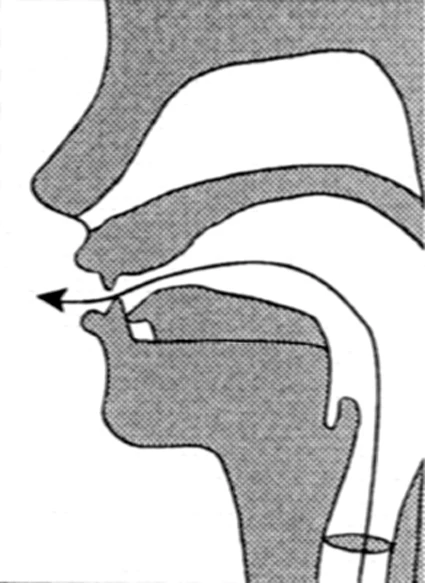
Sound #5: Chuī (Ch-way) – For Your Kidneys & Core Power
What it does: The Chuī sound is your secret weapon for tapping into deep, foundational energy. In TCM, the Kidneys are your "root," storing your core life force. This sound is amazing for calming fear, strengthening your lower back, and boosting willpower. It’s like charging your body's most essential battery.
How to practice the Chuī sound:
- The Mouth Shape: This one is dynamic! Start with your lips slightly apart (like for "Ch"), then gently purse them into a small circle for the "way" part, as if you're gently blowing to cool a hot drink. It’s a soft, flowing "Ch-way."
- The Movement: Inhale as you bring your hands to your lower back, palms resting on your kidneys. Exhale with the "Chuī" sound as you slowly squat down slightly, as if sitting back into a low chair. Keep your back straight! Your hands can slide down the back of your legs as you squat, providing a gentle stretch.
- The Feeling: Direct your attention to your lower back and core. Feel a sense of warmth and solidity building there. You are exhaling fear and insecurity, and inhaling deep, unshakable strength.
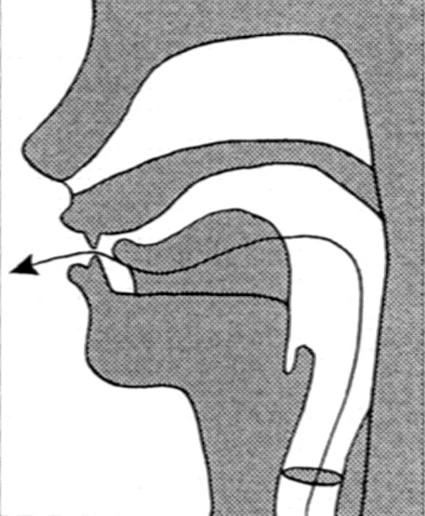
Sound #6: Xī (Shee) – For Your Triple Warmer & Total Balance
What it does: The Xī sound is the master harmonizer. It regulates the "San Jiao" or Triple Warmer, which isn't a single organ but a TCM concept representing three energy centers in your torso.
It controls the flow of fluids and warmth throughout your entire body.
Can Qigong help tinnitus? Often, yes, because tinnitus can be linked to energy blockages that the Xī sound helps to smooth out.
How to practice the Xī sound:
- The Mouth Shape: This is a happy, slight smile. Part your lips and teeth just a tiny bit. The sound is a light, high, and cheerful "Shee," like you're sharing a delightful secret or gently shushing someone. You should feel the vibration high in your palate.
- The Movement: Inhale as you bring your hands up in front of your lower abdomen, palms up. As you exhale with the "Xī" sound, lift your palms up the centerline of your body and continue overhead, palms turning to face the sky as if you're lifting a ball of energy. Then, as you finish the exhale, turn your palms to face the floor and gently lower them back down, sending that balanced energy to every part of your body.
- The Feeling: Imagine a wave of relaxing, balancing energy flowing from your head down to your toes. You are smoothing out all the kinks in your energy system, releasing trapped heat, and finding a state of peaceful equilibrium.
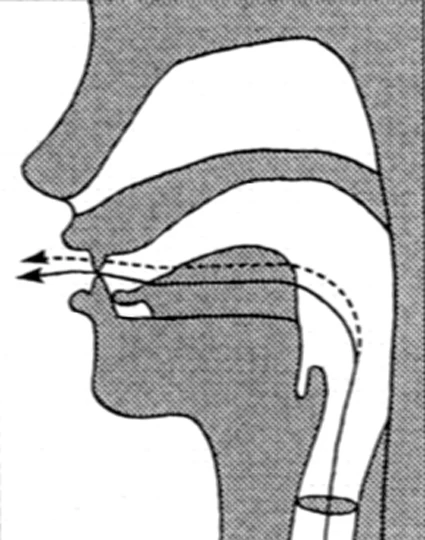
The Final Sound & Your Complete Qigong Routine
Welcome back! You’ve made it to the final sound. This one is special because it doesn’t just target one organ—it tunes up your entire system. If you’ve ever felt completely out of whack, like every part of you is slightly off, this is your reset button.
And let's be real, you might be thinking, "Does Qigong actually work?" or even, "Is Qigong real?" I get it. In a world of quick fixes, this ancient practice can seem too simple. But honestly, the proof is in the practice.
Millions of people over thousands of years can't all be wrong. It works by giving your body and nervous system the one thing they desperately need: deep, mindful rest and regulation.
Your Complete 10-Minute Daily Practice Plan
Now, let’s put all six sounds together into a simple, powerful routine. How long should I do Qigong a day? This plan is perfect.
Your 6-Step Daily Tune-Up
| Step | Description |
|---|---|
| Step 1: Center Yourself (1 min) | Stand comfortably, breathe naturally, and just feel your body. |
| Step 2: Xū for the Liver (1 min) | 3-4 repetitions on each side. Release the day's stress. |
| Step 3: Hē for the Heart (1 min) | 3-4 repetitions. Open your heart and calm your mind. |
| Step 4: Hū for the Spleen (1 min) | 3-4 repetitions on each side. Settle your digestion. |
| Step 5: Sī for the Lungs (1 min) | 3-4 repetitions. Clear your airways and your grief. |
| Step 6: Chuī for the Kidneys (1 min) | 3-4 repetitions. Fortify your core energy and willpower. |
| Step 7: Xī for San Jiao (1 min) | 3-4 repetitions. Harmonize everything. |
| Step 8: Rest & Integrate (2 min) | Stand quietly, hands over your navel. Notice how you feel. |
A Final Tip from Tai Chi Wuji: The best time to practice? Many love the morning to set a calm tone for the day. But when should you do Qigong? Honestly, anytime you can consistently do it is the right time. If you're feeling wired before bed, this routine (done gently) can be a wonderful way to unwind.
Answering a Big Question: Is Qigong a Religion?
This comes up so often, and it's a vital point to clarify. Is Qigong a religion? No, it is not.
Is Qigong a spiritual practice? It can be for some people, depending on their intention, much like yoga. But at its core, Qigong is exercise for your energy system. It’s a health and wellness discipline, based on observable principles of breath, movement, and mental focus.
Think of it like this: you don’t have to believe in a specific doctrine to feel the physical benefits of stretching or deep breathing. The same is true for Qigong. Can Christians do Qigong? Or anyone of any faith?
From my perspective at Tai Chi Wuji, we see it as a science of the body's energy. You are simply working with your own life force to improve your health, which is a gift available to everyone, regardless of spiritual background.
Ba Duan Jin: Your Simple Guide to a Timeless Chinese Fitness Practice
The Real Deal: A Final Word on Qigong's Power
So, let's circle back to the big question: Does Qigong work?
From a scientific perspective, studies show that practices like Qigong can lower cortisol (the stress hormone), improve heart rate variability, and reduce inflammation. It’s a form of self-regulation that directly impacts your nervous system.
From a personal perspective, the benefits of Qigong are felt, not just studied. It’s the feeling of taking a deep breath when you didn't even realize you were holding it. It’s the quieting of a racing mind. It’s the gentle strength that comes from knowing how to recharge your own battery.
Can Qigong make you stronger? Yes—in the most important way. It builds a resilient and calm spirit. It strengthens your connection to your own body. And in our chaotic modern world, that is a superpower.
You now hold the keys to an ancient practice that can transform your daily well-being. This is the true power of Liù Zì Jué, and it’s why at Tai Chi Wuji, we are passionate about sharing these healing Qigong movements with the world.
Your journey to balance begins with a single sound. So take a breath, and give it a try.
FAQ
What is the main difference between Qigong and Tai Chi?
While both are mind-body practices, Qigong and Tai Chi are not the same. Tai Chi is a martial art consisting of a continuous, flowing sequence of movements (a form). Qigong exercises, like the Six Healing Sounds, are often simpler, repetitive movements or static postures focused specifically on breathing and cultivating Qi for health. Think of Qigong as the foundation of energy work that can be applied to many practices, including Tai Chi.
What are the proven health benefits of Qigong?
The health benefits of Qigong are supported by both ancient wisdom and modern science. Research and centuries of practice suggest it can help lower blood pressure, reduce anxiety and stress, improve balance and flexibility, enhance immune function, and promote better sleep. It works by calming the nervous system and improving the flow of energy and blood throughout the body.
Can Qigong help with weight loss or building muscle?
Qigong can support weight loss indirectly by reducing stress (which is linked to weight gain), improving metabolism, and encouraging mindful connection to your body. However, Qigong does not build muscle in the same way strength training does. It develops a different kind of strength—internal strength, tendon resilience, and core stability—which is why many athletes use it as a complementary practice.
Is Qigong safe? Are there any disadvantages or risks?
Qigong is generally very safe for most people as it is low-impact and gentle. The main "disadvantage" is that it requires consistency over time to see profound results; it's not a quick fix. Qigong can be harmful only if you push through pain or have an underlying condition and do not consult a doctor. It's always best to practice Qigong under a qualified instructor, especially when starting.
I have a specific health issue like arthritis, tinnitus, or high blood pressure. Can Qigong help?
Many people find significant relief through consistent practice. Qigong can help arthritis by gently lubricating joints and improving circulation. For those wondering, can Qigong help tinnitus?—the Kidney and San Jiao sounds (Chuī and Xī) are often recommended in TCM for this. Similarly, the calming nature of the practice is well-documented to help lower blood pressure. Always consult your healthcare provider for medical advice.
How often and when should I practice?
For best results, you should practice Qigong daily. How long should I do Qigong a day? Even 10-15 minutes is highly beneficial. Consistency is more important than duration. The best time to do Qigong is in the morning to energize your day or in the evening to wind down, but any time you can create a consistent habit is the right time.
Is Qigong a religion or spiritual practice? Can Christians do it?
This is a crucial distinction. Qigong is not a religion. It is a health and wellness discipline, a form of moving meditation based on principles of breath and energy. While it has roots in Taoist and Buddhist traditions, modern practice is often completely secular. Can Christians do Qigong? Absolutely. When approached as a health-focused Qigong exercise for stress relief and physical well-being, it is compatible with any faith, as you are simply working with your own body's energy.
Where can I learn more and find a good instructor?
Our website, Tai Chi Wuji, offers articles and resources for beginners. To find Qigong classes, check local community centers, yoga studios, or holistic health centers. Look for instructors certified by reputable organizations like the National Qigong Association. A good teacher will emphasize safety, proper alignment, and the mind-body connection.
